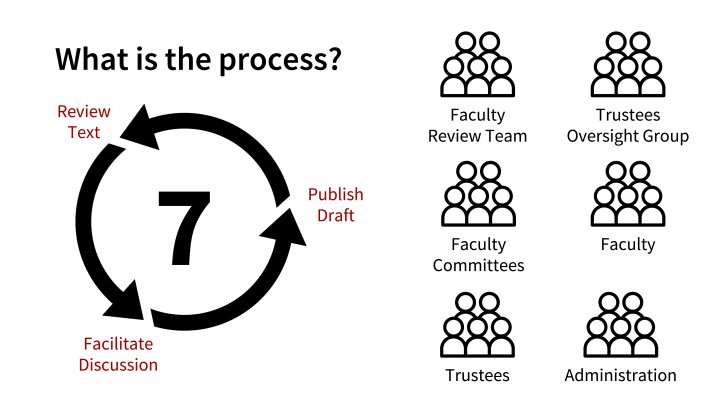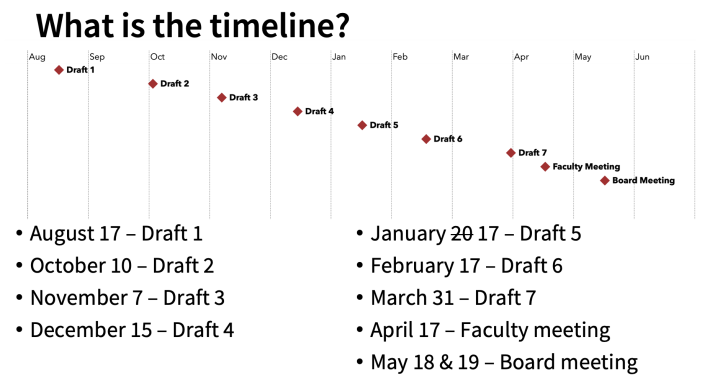Faculty Handbook Revision
In the spring of 2021 the Board of Trustees passed a motion requiring a “complete review of the Faculty Handbook.” This review will provide us the opportunity to bring our Faculty Handbook inline with best practice and to ensure that our Handbook enables the great work we envision ourselves doing in the coming years. Clear and well-written policy manuals, such as a Faculty Handbook, create certainty and clarity, allowing all of us to do our best work. Academic Affairs is looking forward to this project.
Fast Information
What Happens Next - This section provides information about what will happen between April 17, 2023 when the Faculty endorsed a draft of the faculty handbook and May 18/19 when the Board approves a Faculty Handbook.
Blackboard Course - Please visit the Blackboad course titled Faculty Handbook Revision (2023SPRINGACADFHR) to download a copy of the most recent handbook draft, contribute to discussion in the disucssion forum, submit feedback via the Google Form, or review background information. This is our central repository for handbook information distributed to the Faculty.
Next Steps - These are the steps that remain between the April 17 faculty meeting and final approaval of the Faculty Handbook on May 19.
Open Meetings - Please visit this Google Document for a listing of open meetings, the subject of each, the audience for each, and the location.
Process
The process of revising the OWU Faculty Handbook involves seven (7) iterative cycles in which the Faculty Handbook text is reviewed, changes are discussed, and a revised draft is delivered by our consultant. The process includes faculty input at every stage. Input from other constituencies, such as the Administration and Trustees, is solicited at appropriate points in the process.
This work will be collaborative. We have formed an eight-person Review Team consisting of five faculty, the Provost, the Associate Provost, and an external facilitator. These individuals will review and provide feedback on 7 revised drafts of the Faculty Handbook over the course of the next year. Faculty committees will be consulted, and the input of the Faculty as a whole will also be included. Trustees will be kept informed in a parallel process, and their feedback will be provided to the Review Team at intervals through the external facilitator.

Milestones
This project will involve at least seven (7) drafts. Each draft is accompanied by a facilitated discussion and a revision. This cycle of facilitation and revision culminates in presenting a handbook draft to the faculty at the April 17 faculty meeting and a draft of the new handbook to the Board soon after for a vote at their May meeting.
| Date | Deliverable | Status |
| August 17 | Draft #1 | DONE |
| October 3 | Draft #2 | DONE |
| November 7 | Draft #3 - Delivered to faculty committees | DONE |
| December 15 | Draft #4 | DONE |
| January 17 | Draft #5 - Delivered to all faculty | DONE |
| January | Open Meetings with Faculty | DONE |
| February 24 (updated) | Draft #6 | DONE |
| March | Open Meetings with Faculty | DONE |
| March 31 | Draft #7 | DONE |
| April 17 | Faculty Meeting and Vote on Handbook | DONE |
| May 18 | Board Meeting and Vote on Handbook | DONE |

Why Revise the Faculty Handbook?
A Faculty Handbook is a foundational document that defines the relationship of faculty to the University. It sets the framework for the rights and responsibilities of faculty in the context of what we value as an institution. It provides clarity and certainty about how processes work. A faculty handbook should provide for equity and transparency. It should be possible for a new faculty member to read the Faculty Handbook and completely understand what is expected of them and how they will be evaluated.
The current Faculty Handbook has not undergone a comprehensive review in decades. It is now a patchwork of revisions that, while well-meaning, lack a sense of cohesion and clarity. This revision allows us an opportunity to align the handbook with what we value. For example, we can include relevant language about the OWU Connection in a revised handbook.
A Faculty Handbook is reviewed so that it better serves faculty and the institution. A revision provides an opportunity to bring the Faculty Handbook inline with best practice and to ensure that the handbook enables the great work we envision ourselves doing in the coming years. Clear and well-written policy manuals, such as a Faculty Handbook, create certainty and clarity, allowing all of us to do our best work.
Why revise the Faculty Handbook? Because we can do better work and serve our students better if our organizing document is clear, readable, accurate, and complete.
Who Is Doing This Work?
In the Spring 2022 semester, we formed a Faculty Handbook Review Team consisting of the following individuals in collaboration with Stephen Lazarus of Stevens Strategy as facilitator in this process. Please see our communication archive for more detail on how the faculty were selected.
Phokeng Dailey - Faculty Member in Journalism and Communication
Sarah Kaka - Faculty Member in Education
John Krygier - Faculty Member in Environment and Sustainability
Stephanie Merkel - Faculty Member in English
Randy Quaye - Faculty Member in Africana, Gender, and Identity Studies
Karlyn Crowley - Provost
Dale Brugh - Associate Provost for Academic Affairs
Early in this project, the work will be primarily conducted by this team. As the project progresses to draft #2 and #3, more members of the OWU community will be involved.
Who Is the Facilitator?
An important member of this group is the facilitator. The facilitator’s role is to help us navigate this challenging task by bringing external best practice examples for us to consider and by drafting, revising, and reorganizing parts of the Handbook when needed. The facilitator is an enabler who relieves us of the responsibility for inventing a process for revising the Handbook. The facilitator will allow us to focus on content and not how we review content. A good facilitator is key to allow us to revise the Faculty Handbook with minimal additional burden on members of the community.
Ohio Wesleyan has hired Stephen Lazarus, of Stevens Strategy, to serve in the role of facilitator. This decision comes after completing several interviews with potential individuals and companies who do faculty handbook review nationally as well as checking the satisfaction of previous colleges and universities who used their services. We believe we have not only a skilled partner for this important work, but someone considered the best in higher education in faculty handbook review.
What Has Already Happened?
Adoption by Faculty: The Faculty voted to adopt a new Faculty Handbook at the April 17, 2023 faculty meeting by a vote of 60 to 9. The version adopted by the Faculty is a slightly amended version of draft 7, which was delivered to the Faculty on March 31, 2023.
Prior Work: This follows over 1000 person-hours of work by members of the Faculty Handbook Review Team (FHRT) in collaboration with our faciliator, Stephen Lazarus. A total of seven (7) drafts were produced. The first was delivered on August 17, 2022. The last was delivered on March 31, 2023. The FHRT held 16 open meetings to gather input from individual faculty to inform revision between drafts 5 and 6 and again between drafts 6 and 7. The FHRT collected written feedback from standing faculty committees, including FPC, UGC, APAC, CWG, and Executive. These committees, in turn, engaged individual faculty in discussion of the handbook drafts.
What Happens Next?
The Board of Trustees intends to adopt a new Faculty Handbook at their May meeting. These are the steps that remain between April 17 and the conclusion of the Board meeting on May 19, 2023.
-
The version of the Faculty Handbook endorsed by the Faculty at the April 17, 2023 faculty meeting will be presented to the Board of Trustees Handbook Oversight Group (BOTHOG) for review. This is the group that has previously reviewed drafts of the handbook and that has met with members of the Faculty Handbook Review Team (FHRT).
-
The FHRT will meet with BOTHOG to discuss the version of the handbook endorsed by the Faculty and any points of concern along with any questions trustees may have.
-
The BOTHOG will make a recommendation to the Academic Affairs Committee of the Board of Trustees, which is the Board group formally charged with bringing recommendations to the full Board regarding changes to the Faculty Handbook.
-
The FHRT will be informed of the BOTHOG’s recommendations, including if there are any places where the recommendations differ from what the Faculty has endorsed.
-
The Academic Affairs Committee of the Board will meet at their regular May meeting to discuss the Faculty Handbook recommendation from the BOTHOG. Members of UGC will be present for this meeting as usual.
-
If the Academic Affairs Committee of the Board chooses to recommend any changes to the language endorsed by the faculty, the FHRT will be informed.
-
Members of the FHRT will present the faculty’s recommendations to the full Board at a plenary session of the May meeting and will have the opportunity to address the faculty's perspective on any matters of disagreement. The Academic Affairs Committee will also make its recommendations to the full Board of Trustees.
-
The Board will adopt a new Faculty Handbook no later than May 19, and faculty will be informed of the outcome of the process the following week.
What Are the Opportunities for Input?
Committee Input: The Faculty Handbook Review Team will review draft #1 and draft #2 of the Handbook with our facilitator. Portions of draft #3 will be shared with key faculty committees such as University Governance and the Faculty Personnel Committee prior to producing draft #4, which will be shared with the University's attorney. Draft #5, will be shared with the faculty has a whole. As a reminder, there will be seven (7) drafts of the faculty handbook.
Open Meetings: We anticipate there will be at least two sets of open meetings with faculty hosted by the Faculty Handbook Review Team to gather feedback. We anticipate that the first set of open meetings will take place in January and/or early February around release of draft #5. We anticipate that our facilitator, Stephen Lazarus, will be in-person for these meetings to answer questions. We anticipate that the second round of open meetings will be held in late February and/or early March around release of draft #6. The Faculty Handbook Review Team may choose to host additional open meetings. Standing faculty committees may also have open meetings at their discretion to gather faculty input and channel thoughts to the Faculty Handbook Review Team.
Anonmymous Google Feedback Form: The Faculty Handbook Review Team has set up this anonymous Google Feedback Form for faculty to submit feedback or questions. The team encourages faculty to use this form to submit written feedback, rather than email, to ensure that all written feedback is seen by all members of the working group, including our facilitator.
